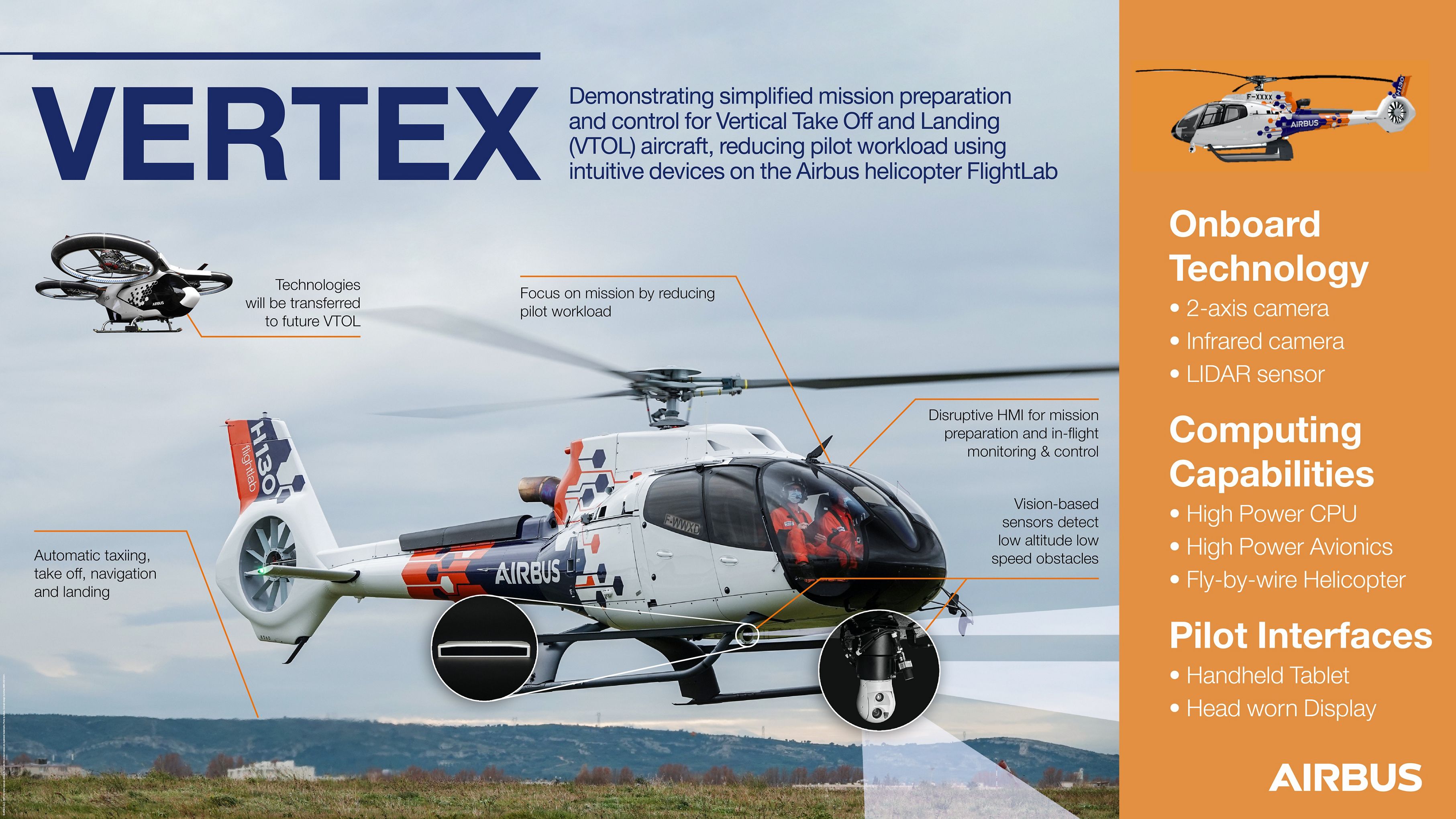Click Here to View This Page on Production Frontend
Click Here to Export Node Content
Click Here to View Printer-Friendly Version (Raw Backend)
Note: front-end display has links to styled print versions.
Content Node ID: 418994
Airbus has started to integrate several enabling technologies for autonomous flight into its Flightlab helicopter. Through the new Vertex project, the company aims to develop and demonstrate ways to simplify mission preparation and management to reduce pilot workload with a view to introducing these innovations on next-generation rotorcraft and eVTOL aircraft.
The Airbus UpNext technology incubator subsidiary is overseeing the Vertex project, which will incorporate full fly-by-wire controls and a high-capacity central processing unit to support an enhanced autopilot. During this year and 2022, it will conduct initial flight tests to prepare for a full demonstration program on the Airbus H130 Flightlab aircraft to start in 2023.
The Airbus team is acting as systems integrator for onboard technology that includes a two-axis camera (provided by Merio), an infrared camera (IDS), and a lidar sensor (Luminar) to support improved situational awareness and obstacle detection. The flight trials will also incorporate a combination of a touchscreen tablet and a head-worn display.
Severin Dauvergne, head of the Vertex project, said that initial flight testing this year will focus on acquiring data from the cameras to develop flight-control algorithms. Next year, the focus will shift to acquiring data from the lidar sensor and also to converting the Flightlab helicopter to fly-by-wire controls.
The goal is to simplify mission preparation and control tasks to the point where all the pilot has to do is input a destination and confirm it on the tablet. His or her role is then to monitor flight operations, freeing up time and attention for work related to missions that might include search and rescue, emergency medical support, and firefighting. The pilot can take back control of the aircraft at any time to make adjustments to the flight, for instance by using the cameras to pinpoint an exact landing spot on approach. “We don’t have it in our roadmap to remove the pilot from the decision loop,” Dauvergne told FutureFlight.
Beyond helicopters, Airbus sees the technology featuring in the eVTOL aircraft it plans to develop for the urban air mobility market. Joerg Mueller, head of Airbus’s Urban Air Mobility (UAM) business unit, stressed that it expects operations to begin with qualified pilots on board while leaving the door open to a gradual transition to fully autonomous flight with no pilot on board.
The all-electric CityAirbus technology demonstrator is set to resume flight testing in southern Germany over the summer. Without giving a specific timeline for the next steps, Mueller confirmed that Airbus intends to bring an eVTOL aircraft to market.
“We are developing the technology base to produce an eVTOL aircraft,” he told FutureFlight. “It is too premature to explain what steps we will take next, but we are definitely part of the UAM story in the long run.”
Airbus UpNext is tasked with testing a variety of new technologies to assess their applicability to programs being developed elsewhere in the Airbus group. For instance, it was responsible for the Autonomous Taxi, Take-off, and Landing (ATTOL) project that concluded in June 2020 when an A350-1000 widebody airliner made a fully automated flight using onboard image-recognition technology.
The company is also involved in developing hydrogen propulsion and cryogenic systems for Airbus's ZeroE hydrogen-powered airliner program. "Our job is to spend two or three years assessing whether a new technology is feasible and how it could be transferred [to a specific application]," Dauvergne explained.
“We are convinced that it is the right way to go to have a pilot on board [for UAM air taxi services], but this technology [being demonstrated through the Vertex project] is very complementary to that approach and once it is mature and the regulations have evolved, it could be that eventually, we don’t need a pilot on board,” he said, indicating that that point might not be reached during the current decade.
In his view, many UAM operations would be relatively simple compared with more complex missions like search-and-rescue flights in that they would fly between two fixed points. In that regard, they would arguably be well suited to autonomous operations, but given safety concerns for passenger flights in dense city environments, Airbus sees an ongoing requirement for an onboard pilot for some time.
